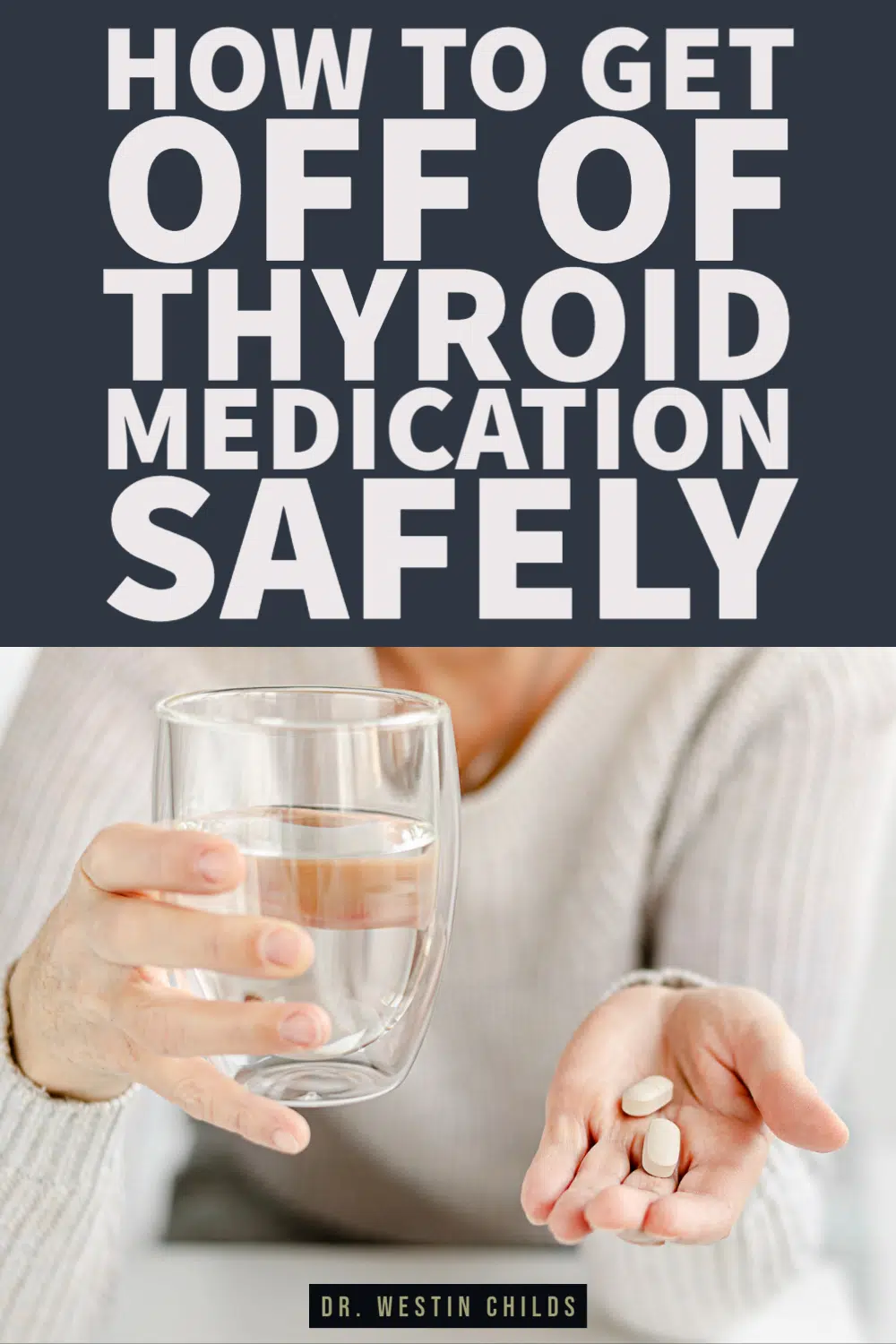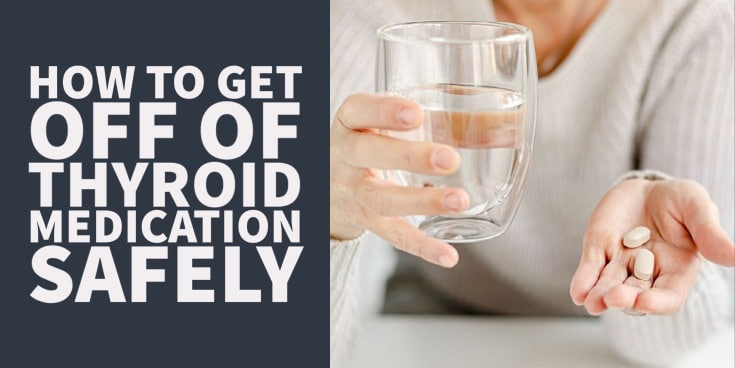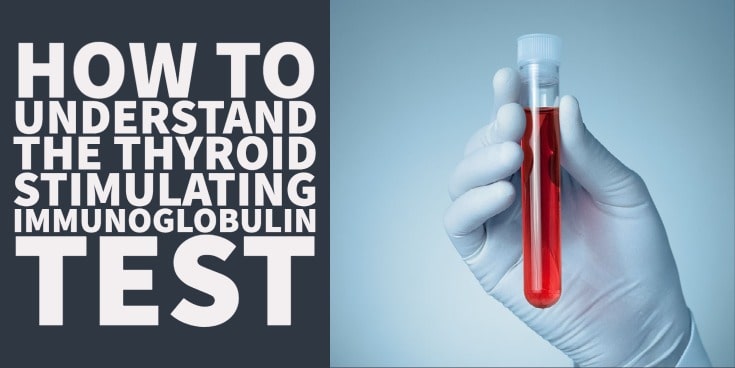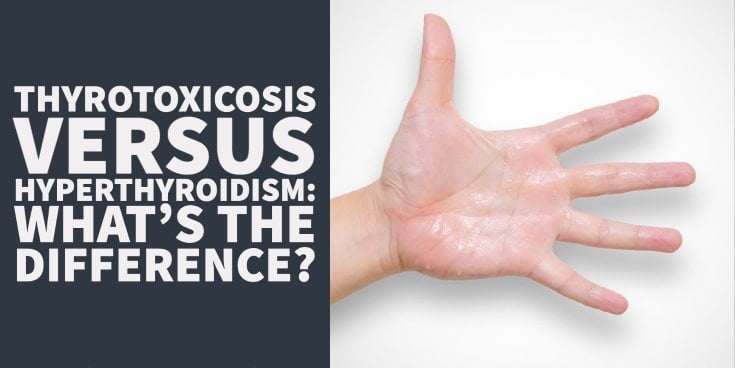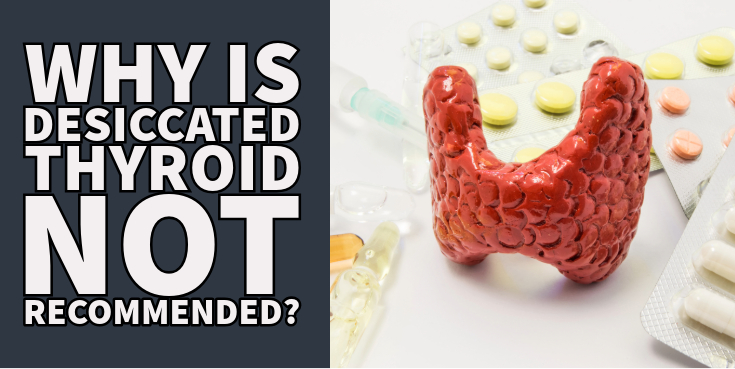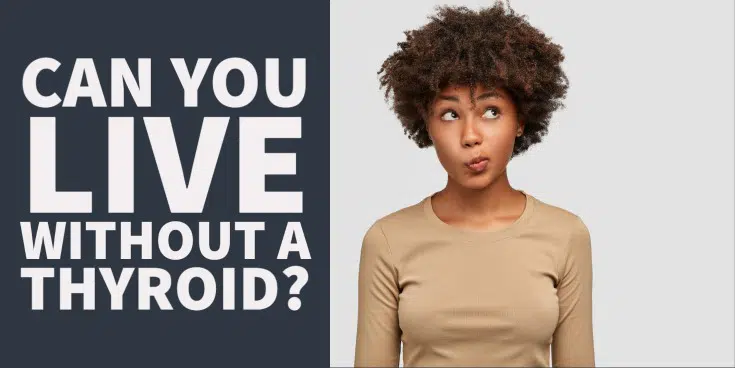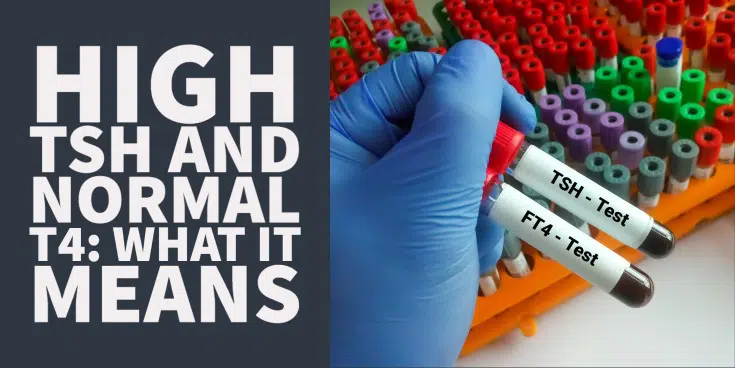If you’re like most thyroid patients then you’ve probably been told that once you start taking thyroid medication you have to be on it for the rest of your life.
But what if I told you that this isn’t the whole story?
What if I told you that there are plenty of people who can get off of their thyroid medication?
It may sound too good to be true but it doesn’t have to be.
New studies suggest that as many as 30% of thyroid patients (1) may be taking thyroid medication when they don’t need it and may be able to get off of it.
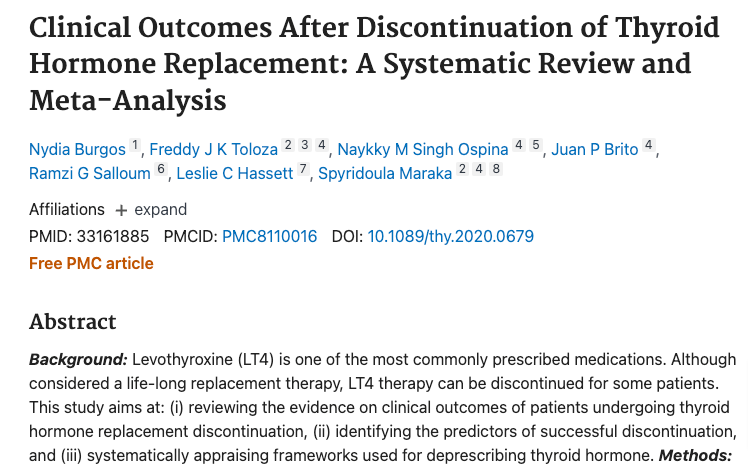
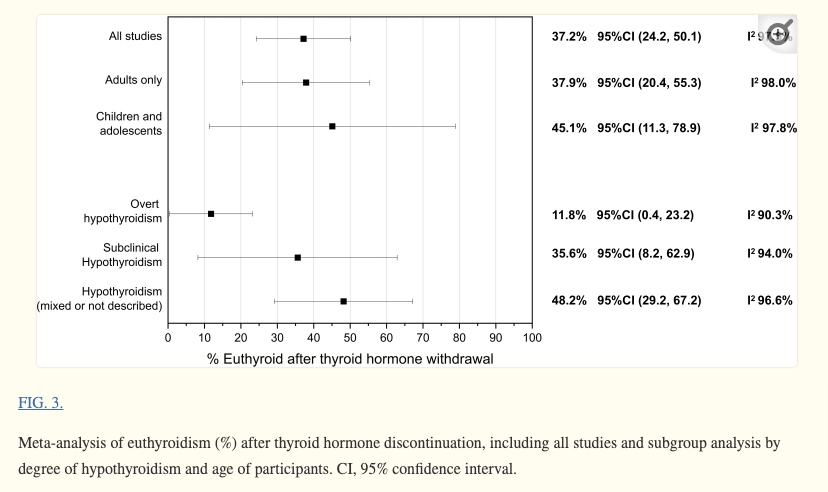
That’s a huge number of people when you consider that levothyroxine is one of the most commonly prescribed medications in the United States (2)!
But how is it possible that so many people may be able to stop taking their medication?
The reason is simple:
There are plenty of causes of reversible hypothyroidism (low thyroid function) and some of these conditions either go away on their own or can be reversed through therapies and actions that you take.
For instance, if you are someone who has been following the advice listed on my blog about how to change your diet, how to use thyroid support supplements, how to replace nutrient deficiencies, and how to exercise appropriately, then there’s a chance that you may fall into that group.
In addition to this group of people, there are also thyroid patients who may have been incorrectly placed on thyroid medication and have been taking it for years because no one ever stopped to ask why they were placed on it in the first place.
Regardless of the reason, there’s a chance that you can stop taking it.
It’s not a guarantee, though, which we will soon talk about but this potential outcome is something that every thyroid patient should know.
Today you will learn:
- Why some patients can get off of their thyroid medication
- Who shouldn’t try to wean themselves off of their medication and who must stay on it for life
- How to go about reducing your dose in a safe way
- What symptoms to look out for as you reduce your dose and which symptoms mean you are more likely to have a poor outcome
- How to use supplements to help your thyroid gland function as you reduce your dose of thyroid medication
- And much more…
Disclaimer: Don’t Try This Without Physician Support
Before we talk about the how, a disclaimer is necessary:
You should never try to wean yourself off of thyroid medication without physician support!
Why?
Because thyroid hormone is a hormone that is required for life and some causes of low thyroid function result in permanent damage to your thyroid gland.
In these cases, it’s not possible to wean yourself off of your thyroid medication because that medication is life-sustaining!
The good news is that there are only a handful of conditions that cause this problem and those include people who have had their thyroid removed (via thyroidectomy), people who have undergone radioactive iodine ablation (RAI), and people who are in end-stage Hashimoto’s.
All of these conditions have one thing in common:
They result in permanent damage to the thyroid gland which means these people are reliant upon thyroid medication as their primary source of thyroid hormone.
One other group of patients that should not attempt to deprescribe off of thyroid medication include those who are breastfeeding and those who are actively pregnant.
Thyroid hormone is very important for fetal development and should not be altered or changed during pregnancy unless absolutely necessary (3).
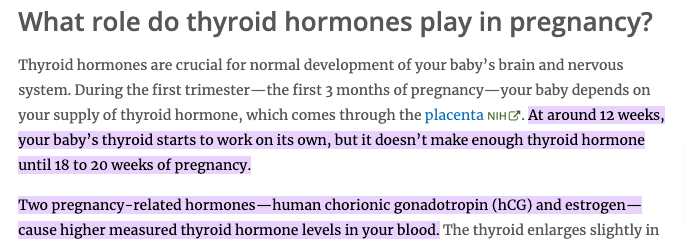
And in the postpartum period, thyroid hormone is important for balancing sex hormones, balancing mood, and allowing your body to get back to its pre-pregnant normal state.
If you are pregnant or breastfeeding you can always try to wean off of your medication when you are done.
What about everyone else?
What if you have early or mid-stage Hashimoto’s?
What if you were put on thyroid medication for some unknown reason?
What if your thyroid isn’t functioning because of other medical conditions which have since been resolved?
What if you are taking a low dose of thyroid medication and have noticed little benefit?
What if your thyroid wasn’t working well because of nutrient deficiencies that have since been resolved?
What if you were put on thyroid medication because you were overweight but have since lost that weight?
These situations all have one thing in common:
They result in reversible hypothyroidism!
And if your hypothyroidism is reversible, there’s a chance you may no longer need to be on thyroid medication.
Okay, But How Likely Is it?
The only thing I’m certain of in this life is death and taxes.
In other words, even though there is some data that suggests getting off of thyroid medication is possible, how likely is it that you will be able to get off of thyroid medication given your own personal situation?
Well, it depends on many factors but we do have some data to help guide us.
We know from the experience of other thyroid patients that these signs indicate you have a higher chance to get off of your thyroid medication:
- If you’ve been taking your thyroid medication for less than 4 years
- If you had normal free T4 levels when you were diagnosed
- If your current TSH is less than 1.8
- If you are taking a low dose of thyroid medication (around 50mcg of levothyroxine or less)
- If you are a woman (women are twice as likely to get off of their thyroid medication compared to men)
On the other hand, these factors predict that you will remain hypothyroid after you discontinue your thyroid medication or, in other words, you won’t be able to stay off of it:
- If you have a heterogeneous thyroid on ultrasound (a finding commonly associated with Hashimoto’s thyroiditis and Graves’ disease)
- If you have positive thyroid peroxidase antibodies with diffuse hypoechogenicity on thyroid ultrasound (4)
- If your TSH is greater than 8 at diagnosis
- If your baseline TSH is > 9.0 mIU/L
- If were diagnosed at a young age with thyroid disease (the younger you are the more difficult it is)
- If you have positive anti-thyroglobulin antibodies at diagnosis
- *Note: some of these factors apply to children and adolescents and some studies show different criteria so this information is not set in stone.
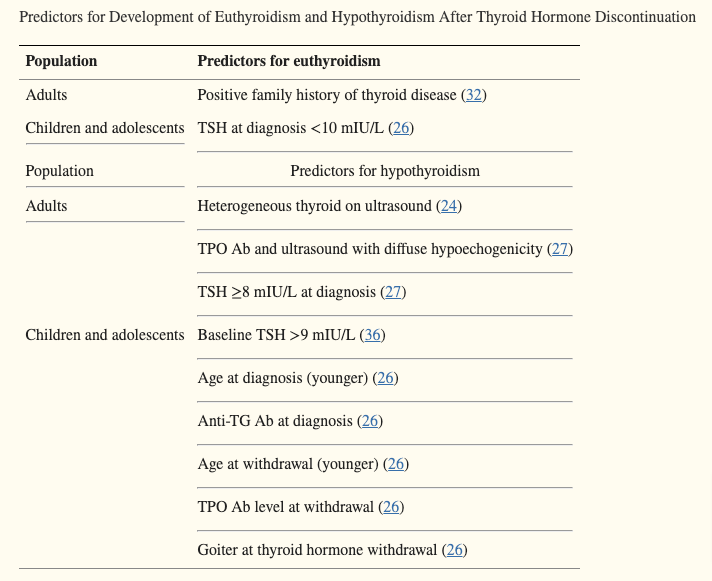
In general, the more severe your thyroid disease, the longer you’ve had it, and the more aggressive it is, the less likely you will be to stop taking your medication.
As always, your mileage may vary, so don’t lose hope even if you don’t fit the criteria above.
It’s still worth a shot to see how you do.
6 Things to Know Before You Try to Wean Yourself Off of Thyroid Medication
#1. You Need Your Doctor on Board
Before you do anything make sure that you discuss this with your doctor.
The reason you want to get your doctor on board is just to make sure you don’t do anything that could accidentally cause harm.
Getting off of thyroid medication isn’t a dangerous thing to do, as long as it is done correctly, but it may result in some changes in how you feel which should be evaluated by someone who knows what those changes mean.
You will need assistance from your doctor both in monitoring your symptoms and in ordering thyroid lab tests to determine how you are responding.
If you can’t get your doctor on board then you will want to seek out a second opinion using the resources found here.
I can’t express how important it is to do this with physician support so please do not try this unless you are being monitored by a doctor.
I’ve found that many doctors are pretty good about giving this sort of thing a try even if they aren’t up to date on other thyroid treatments and medications.
#2. Take it Low and Slow
Remember:
It’s not a race!
In this case, the fastest to the finish line isn’t always the one who wins, and here’s why…
As you take thyroid medication you are suppressing the normal feedback loop that exists in your brain and thyroid gland.
In a healthy person, your brain (via TSH and TRH (5)) talks to your thyroid gland which tells it how much T4 and T3 it needs to produce.
When you introduce synthetic or natural thyroid hormone into the equation (in the form of prescription thyroid medications or over-the-counter T2 thyroid hormone) you are shutting down this two-way messaging system so that your brain doesn’t communicate with your thyroid gland.
The more thyroid medication that you take and the longer you take it, the more suppressed this communication will be.

This is important because as you reduce your dose of thyroid medication you have to give your brain enough time to come back ‘online’ and start talking to your thyroid gland.
Luckily, the thyroid gland system (known as the HPT or hypothalamic-pituitary-thyroid axis (6)) tends to recover much faster than other endocrine systems.
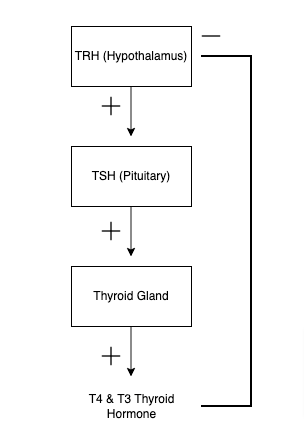
Systems such as your adrenal system (HPA axis) (7) and testosterone (HPT axis) can take months or even years to fully recover.
In the case of the thyroid system (HPT axis), it usually recovers within weeks to months.
Providing time allows this system to recalibrate and begin functioning again which is required if you want to stay off of your medication.
#3. Monitor Your Symptoms as you Decrease Your Dose
As you reduce your dose of thyroid medication, you want to make sure you are keeping a close eye on how you are feeling.
When you reduce your dose of thyroid medication you are removing the source of thyroid hormone that your body used to rely upon.
As this occurs, it’s not uncommon to see changes in how you feel!
In fact, as many as 50% of people who reduce their dose of thyroid medication will experience some symptoms.
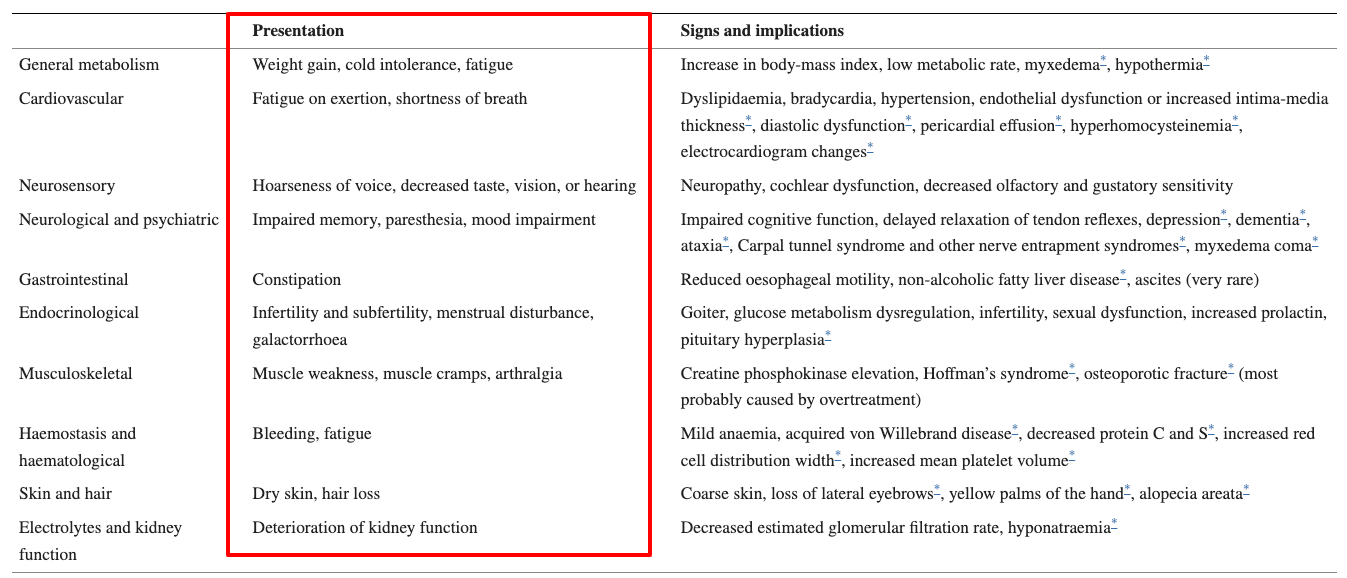
These symptoms can vary from severe and serious to mild and benign.
Your symptoms can help guide you and help you determine if you are reducing your dose too quickly, if you need to slow down, or if you should go back up to your old dose.
In terms of outcomes, it’s generally a bad sign if you start to experience severe hypothyroid symptoms as you titrate down on your thyroid medication dose.
If your symptoms are mild and tend to improve then this is a pretty good indication that your body is able to adapt to the changes.
Understanding these symptoms is very important because feeling worse isn’t always a bad thing.
In fact, feeling worse is going to be part of the game as you deprescribe.
#4. You May Feel Worse as you Reduce your Dose (and it isn’t always a bad thing)
As mentioned above, you may start to feel your old hypothyroid symptoms come back when you lower your dose.
You might automatically think this is a bad thing but that isn’t always the case.
When you reduce your dose there is a small window of time between when your body can start producing enough thyroid hormone on its own to make up for the lost thyroid hormone that you were giving to it from your medication.
During this window, you may feel poorly because your body is operating with less thyroid hormone than it used to.
Even though you may feel worse, this is usually temporary, provided your own body can kick in and start producing thyroid hormone on its own.
Because of this, as you reduce your dose you may experience waves of low thyroid symptoms.
To make matters a little more confusing, though, there’s also a situation in which those low thyroid symptoms are a bad sign.
If you lower your dose of thyroid medication and your body can’t take over for that lost thyroid hormone then you will feel significantly worse.
This could happen because part of your thyroid gland is no longer working or because there’s an issue with your pituitary gland, in either event, you will most likely not be able to get off of your thyroid medication if that’s the case.
How to differentiate between these two conditions can be difficult but I’ve found that most of the time thyroid patients can discern between the two intuitively.
If you are looking for more concrete metrics, some studies suggest that the presence of these symptoms while lowering your dose of medication predicts a poor outcome (8):
- Facial swelling or facial edema
- Constipation
- Weight gain
- Severe fatigue
- And a TSH greater than 10 on lab testing
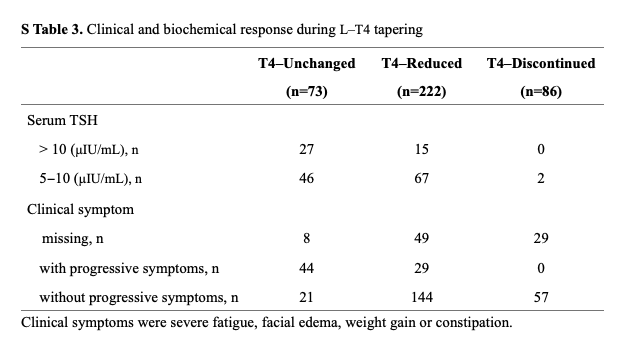
Severe versions of fatigue and weight gain are likely early indicators that your own thyroid gland is not coming back online.
This is especially true if these symptoms persist or even get worse over a period of time.
The presence of these symptoms by themselves isn’t bad if they go away or improve within a matter of a few weeks but if they persist for longer than that then it’s a bad sign.
#5. Make Sure to Give your Body Enough Time to Start Working Again
As you think about getting off of your thyroid medication, you need to consider your own personal situation.
For instance, have you been taking thyroid medication for years or decades?
Are you someone who has required high doses of thyroid medication over the years?
Are you someone who has always had issues with finding the right dose for your body?
If you answered yes to any of these conditions then they all may impact how long it will take for your own thyroid gland to begin functioning again.
In these cases, you will want to make sure that you give your body a sufficient amount of time to recover before you determine that you can’t get off of your medication.
In most cases, the thyroid system is able to recover back to its normal state within 2-6 months but this is just a general timeframe.
#6. Use Thyroid Supplements to Support Thyroid Function
If you aren’t already, I would also recommend that you consider using thyroid supplements to help your thyroid gland as you wean off of your thyroid medication.
Even though you are reducing your thyroid medication you can still support thyroid function in your body with the use of certain vitamins, minerals, and botanical ingredients.
And these supplements can help your thyroid gland work more efficiently as long as you use the right ones.
When trying to get off of your thyroid medication, here are the supplements you’d want to consider using:
- Supplements that support thyroid production from the thyroid gland – As your thyroid comes back online you can help support it by providing it with the nutrients it requires to produce thyroid hormone. Remember, your thyroid gland produces T4 and T3 thyroid hormones when it is stimulated by the brain via TSH. Most important on this list include iodine (9), tyrosine (10), and iron (11). These nutrients are required at various steps in the production of T4 and T3 and taking them in supplement form may help your thyroid more easily produce the thyroid hormone it needs. When it comes to iron, you’ll only want to take it if you have a documented deficiency. The other nutrients like tyrosine and iodine can typically be taken without testing.
- Supplements that support thyroid conversion – In addition to supporting thyroid hormone production, you will also want to support T4 to T3 conversion. Thyroid conversion is the process your body uses to produce the most powerful thyroid hormone T3. Optimizing T3 production both from your thyroid gland and from thyroid conversion can help ensure a smooth transition from thyroid medication to the production of thyroid hormone from your own gland. Supplements that help this process include zinc, selenium, and guggul extract.
- Supplements that support thyroid hormone sensitivity – Next, you can take nutrients that help the thyroid hormone that your thyroid gland produces do its job at the cellular level. Vitamins A and E (12), as well as zinc (13), assist in this process.
- Supplements that contain thyroid glandulars – Another ingredient to consider using would be thyroid glandulars. Thyroid glandulars are portions of thyroid glands from animals that contain ingredients, prohormones, proteins, and enzymes that can help assist your thyroid function.
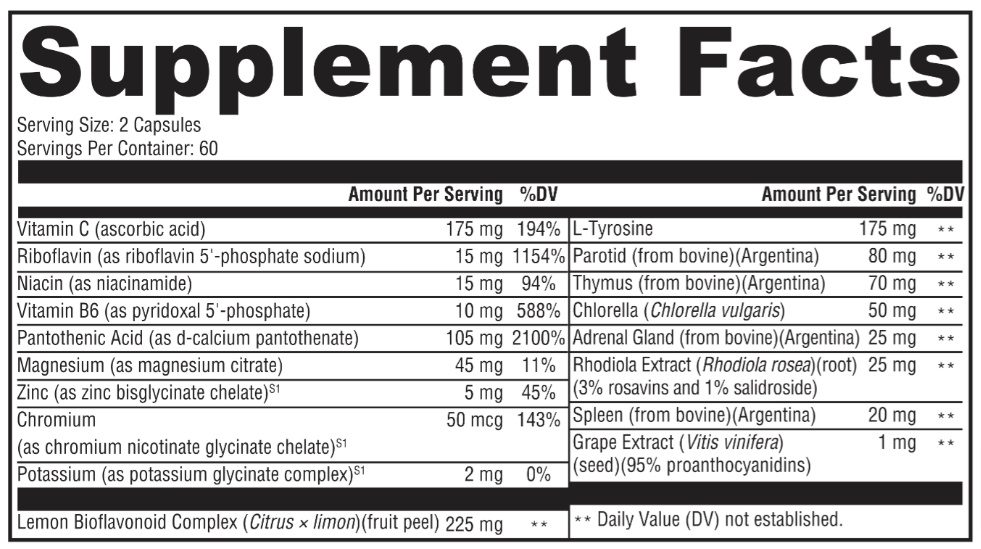
Thyroid support supplements are by no means a replacement for thyroid medication because they contain completely different ingredients, but they may help improve your chances of getting off thyroid medication by taking the edge off negative symptoms that you may experience as attempt it.
Practical Examples of Titrating Off of Thyroid Medication
To illustrate how this might look for you, let’s create two different scenarios:
Example #1:
Let’s imagine you are someone who is taking 100mcg of levothyroxine. In this case, you have been taking levothyroxine for 2-3 years and you are using it for hypothyroidism of unknown cause (you don’t know why you are taking thyroid medication except that your labs showed you needed it).
Because you’ve only been taking thyroid medication for 2-3 years (which is a fairly short time period for thyroid patients) and because you are taking levothyroxine, you can try to get off of your thyroid medication using the standard approach.
This is what it would look like for you:
- Start by taking thyroid support supplements for 2-3 months before you attempt to reduce your dose
- After 2-3 months of using your thyroid supplements, you would reduce your dose of levothyroxine down to 75mcg (from 100mcg)
- After 2 weeks you would then decrease your dose down to 50mcg
- After another 2 weeks (1 month from when you started) you would reduce your dose down to 25mcg
- After another 2 weeks (6 weeks from when you started) you would then reduce your dose down to 0mcg
- Allow your body 2-4 weeks to acclimate before rechecking your labs (TSH, free T3, free T4, and reverse T3)
- *Note: you should recheck your labs at the 6-week mark or if you experience a sudden or abrupt worsening in your thyroid symptoms (if you find that your TSH is > 10.0 this is a sign you are not responding well)
In this example, you would be able to completely come off of your thyroid medication in about a 6 week period.
Because levothyroxine stays in the system for about 1 month (due to its half-life of 7 days (14)), you will still have some residual thyroid hormone floating around in your body for 4 weeks after you completely go off of your thyroid medication.

This is good because it gives your own pituitary gland some time to come back online.
Most people feel really good when they start going off of their thyroid medication and it isn’t until 1 month after they completely stop taking it that they feel the effects.
So it’s around this time that you want to pay close attention to how you are feeling.
Let’s use another example.
Example #2:
Now let’s imagine that you are someone who has been on thyroid medication for 10 years and, in this case, you are using Armour thyroid to treat low thyroid function from Hashimoto’s thyroiditis.
Your dose of Armour thyroid is 60mg and you’d like to try to wean yourself off of it.
This situation is a little bit different from the first because Hashimoto’s can lead to permanent thyroid gland destruction.
This is something you have to keep in mind if you are trying to wean yourself off of thyroid medication if you have Hashimoto’s.
If your Hashimoto’s has been around for many years then you can bet that there is at least some permanent damage present but there’s no way to know how much until you try to go off of your medication.
Because of this, and because you are using a thyroid medication that contains T3 (which has a half-life of about 2.5 days (15) compared to the 7-day half-life of T4), you will want to wean yourself off a little bit slower than our first example.
This is what it might look like:
- Start by taking thyroid support supplements for 2-3 months before you attempt to reduce your dose
- Reduce your dose from 60mg of Armour thyroid to 45mg
- After 2-4 weeks (depending on how you feel), reduce your dose from 45mg to 30mg
- After 2-4 weeks (depending on how you feel), reduce your dose from 30mg to 15mg
- After another 2-4 weeks (depending on how you feel), reduce your dose from 15mg to 0mg
- Allow your body 2-4 weeks to acclimate before rechecking your labs (TSH, free T3, free T4, and reverse T3)
- *Note: you should recheck your labs at the 6-week mark or if you experience a sudden or abrupt worsening in your thyroid symptoms (if you find that your TSH is > 10.0 this is a sign you are not responding well)
This method is similar to the first but allows for extra time between dose reductions.
Using this strategy, you can reduce your dose down to 0 in as short as 6 weeks or as long as 12 weeks.
This slower approach is ideal for people using Armour thyroid (or other medications with T3) because the half-life for T3 is less than half of that of T4.
The half-life refers to how long it takes your body to eliminate half of that ingredient.
And it takes about 4 to 5 half-lives (16) for any medication to completely clear your system.
This means that medications that contain T4 will be in your system for 35 days (7-day half-life x 5 half-lives for elimination) and that T3 will be in your system for 12.5 days (2.5-day half-life x 5 half-lives) after your last dose.
In other words, T3 won’t stick around in your body as long as T4 will.
And because T3 is much more powerful than T4 (17), you are likely to feel more symptomatic as you drop your dose compared to someone taking only T4 medications like levothyroxine or Synthroid.
This isn’t always true but it’s a general rule that you can use to guide your deprescribing.
Your Next Steps
Is it possible to wean yourself off of thyroid medication?
Yes, but it should never be done without physician supervision.
There are some thyroid conditions that require thyroid medication and you would not want to try and go off of your thyroid medication if you have one of these conditions.
If you are serious about getting off of thyroid medication then I would encourage you to get aggressive with natural therapies before you give it a try.
As you take supplements, change your diet, reduce your stress, and get more sleep, you will give your body the best shot it has at getting off of your medication.
Please note that not everyone will be able to do this, though, so don’t be frustrated if you are someone who can’t.
Just because you can’t right now doesn’t mean you won’t be able to in the future, though.
Now I want to hear from you:
Did you know that some people can get off of their thyroid medication for good?
Have you ever tried to wean yourself off of your thyroid medication?
How did it work for you? Did you feel better or worse as you did it?
Are you planning on discussing this with your doctor to see if it’s right for you?
Leave your questions or comments below!
Scientific References
#1. pubmed.ncbi.nlm.nih.gov/33161885/
#2. goodrx.com/drug-guide
#3. niddk.nih.gov/health-information/endocrine-diseases/pregnancy-thyroid-disease/
#4. ncbi.nlm.nih.gov/pmc/articles/PMC8409448/
#5. ncbi.nlm.nih.gov/pmc/articles/PMC2849853/
#6. pubmed.ncbi.nlm.nih.gov/27347897/
#7. ncbi.nlm.nih.gov/books/NBK279156/
#8. pubmed.ncbi.nlm.nih.gov/32469958/
#9. ncbi.nlm.nih.gov/pmc/articles/PMC4049553/
#10. ncbi.nlm.nih.gov/books/NBK285550/
#11. pubmed.ncbi.nlm.nih.gov/11099370/
#12. ncbi.nlm.nih.gov/pmc/articles/PMC9592814/
#13. pubmed.ncbi.nlm.nih.gov/8670238/
#14. ncbi.nlm.nih.gov/pmc/articles/PMC6822824/
#15. ncbi.nlm.nih.gov/pmc/articles/PMC4350501/
#16. ncbi.nlm.nih.gov/books/NBK554498/
#17. ncbi.nlm.nih.gov/books/NBK499850/
